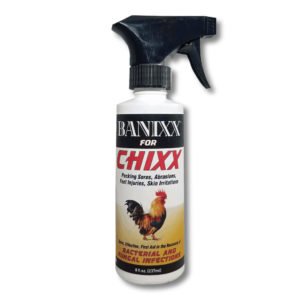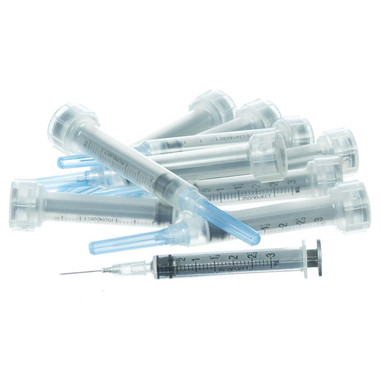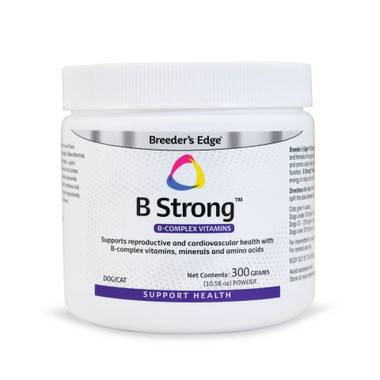Chicken Wound Care: How to Treat an Open Wound on a Chicken?
Estimated 0 min read
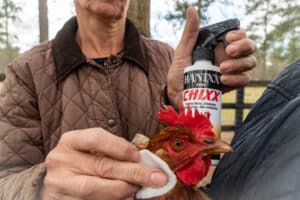
Chicken treated with Banixx Chicken Spray
First things first.Halt the Bleeding. Just as you would with a human bleeding wound, apply pressure with gauze or simply a piece of clean cloth. If you need some sort of product to apply, you can easily use cornstarch or even flour. If you deem the situation to be more dire, contact your local vet without delay.
Next,Clean the Wound.Depending on the situation, rinse the wound with saline or simply use warm water. Now you should have a clean wound devoid of any dirt, grime or bacteria. If it’s necessary, you may need to remove debris such as soil, coop gravel or even feathers from your injured chick. Tweezers are an option for this but make sure they’re sanitized (use very hot water, saline or your favorite antimicrobial for this). Work carefully to as not to further damage your chicken.
Finally – Apply aTopical Banixx Treatment.Banixx is a powerful yet incredibly gentle anti-bacterial (and anti-fungal) for your bird. It’s so effective yet so safe and can even be used without worry around your chick’s eyes! Avoid products such as Iodine, Rubbing Alcohol or Hydrogen Peroxide. These are harmful to healthy tissue and will burn causing pain to your feathered friend. Yes, they used to be a product of choice but they are not a kind option by any means!
Will you need an Antibiotic for your Chicken’s Wound?
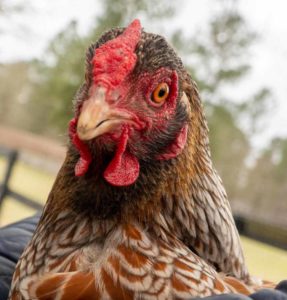 The right antibiotic for your chicken will depend on the severity of the wound and the type of bacteria causing the infection.
The right antibiotic for your chicken will depend on the severity of the wound and the type of bacteria causing the infection.
Amoxicillin is one of the more usual antibiotics used for chickens’ wounds and infections. It is effective on a broad scale so it’s a broad-spectrum antibiotic. It’s generally recommended for respiratory and skin infections, including wounds caused by bacterial infections.
There are a host of other effective antibiotics for chicken disease issues depending on the source of the infection, but this is a conversation for you to have with your vet.
Consistency with Treatment is Vital.
One of the most vital things to bear in mind when treating a chicken wound, or for that matter, any pet wound, is to continue applying treatments as needed. Rather treat for too long than stop too soon. Stopping too soon may give rise to increased infection, then you have to start all over again and, possibly, even involve your vet (again) along with costly bills.
Check the wound daily to check for any lapse in the healing process. And, as we said, continue with your Banixx treatments until you see good healing taking place and new tissue settling in.
What about applying a Bandage or wrap on Chicken Wounds?
Good question but often impractical when it comes to chickens!
Mostly, chicken wound bandages are not the best idea. Since other poultry will peck at them and you run the risk that they will ingest them. That’s more problems.
On the other hand, if the wound is deep or if the bird is pecking at the wound continuously, you may have to get inventive. In this case we strongly suggest that you isolate your bird.
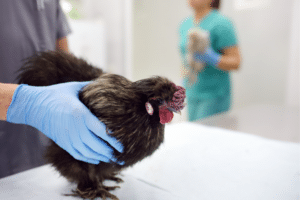
When in doubt, schedule a vet check
Contact your Vet if You’re Uncertain
If you’re not certain how to handle or care for your chicken’s wound, be sure to contact your veterinarian. While he or she may not be an avian vet, they can provide direction on wound treatment. They may be able to help, recommend any necessary medication or simply put you in touch with a veterinarian who specializes in this area.
Remember that wounds that are not treated can quickly become infected, leading to serious health consequences for your bird. Along with this will come hefty vet bills too.
How Long Does it Take for a Chicken Wound to Heal?
Clearly, the healing progression of a chicken’s wound depends on the type of injury, the seriousness and of course, the location. But more to the point is the age and overall health status of your bird.
Chickens have an extraordinary capacity to repair tissue and revitalize new tissue. They have the reputation for being one of the quickest to heal of all creatures.
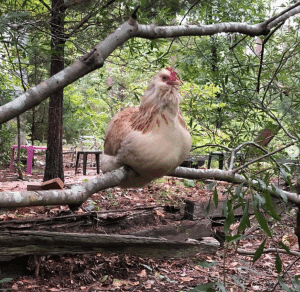
Keep your chicken isolated from others.
However, the recovery rate and pace will depend on other swaying scenarios just as it is in the animal kingdom, humans included! Records show that a healthy chicken generally achieves wound repair within a month or so. Some have healed wound/s in as little as two weeks! Age is clearly an important component in this one. Moreover, overall chicken health and nutrition also play an important role.
How can I effect more speedy healing?
In fact, there are several methods that are suggested to improve your chick’s recovery and healing process. Vitamins and supplements such as vitamins A and E are endorsed for this. These nutrients are acclaimed to promote cell regeneration and improve the immune system.
Additionally, it’s proposed that the chicken owner provide ample amounts of high-quality protein sources such as eggs, chicken meat or mealworms. These ingredients will help your chicken regenerate healthy tissue and encourage faster reparation and restoration.
In conclusion, ensure that your chicken gets rest and protection from unforgiving weather conditions or from other chickens who are bullies. It goes without saying that this will aid in more speedy quicker recuperation.
Tips on Preventing Chicken Wounds
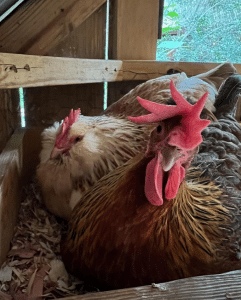
Be proactive. Keep chicken’s living space clean
The easiest way to avoid chicken injuries and wounds is to ensure that their living space is orderly and secure.
This includes routinely cleaning and maintaining/repairing their home. But it also encompasses the immediate surrounding areas. Regularly look out for any threats and dangers such as rough or jagged edges. Be cognizant that the birds have sufficient space so that they can move around freely and stay clear of each other if necessary.
It’s a good idea to schedule regular visits with a veterinarian who is knowledgeable in avian care. They can help point out possible health issues and perhaps even prevent future injuries. It’s worth a consultation to check this out.
Keeping your chickens healthy and safe is right up their alley but of course, they can also supply treatments and prescribe medication.
A no-brainer for your chickens’ health is to feed your chickens a balanced diet. It will need to be one that is high in vital nutritional value and vitamins. Consider Calcium and Vitamin D to encourage strong bones and feathers. Additionally, there are immune-boosting herbs such as garlic and oregano to ward off infections.
Just as with a human, nutrition is the key to maintain their health and possibly render them more immune to injury.
Summary: Chicken Wound Care
Caring for an injured chicken isn’t an easy proposition. Moreover, personal care of your chicken’s wounds is vital if you want to give them the best chance of recovering.
By reading and absorbing these ideas and tips on chicken wound care, you can give your chickens the best chance for a serene and healthy life. Moreover, that just may spill into your life and improve it for you!
Visit ourchicken blogfor tips onchicken coop accessories,if chicken saddles are right for your chicken, as well asprofessional chicken advise from Dr. Porter.
Source:www.thehappychickencoop.com



